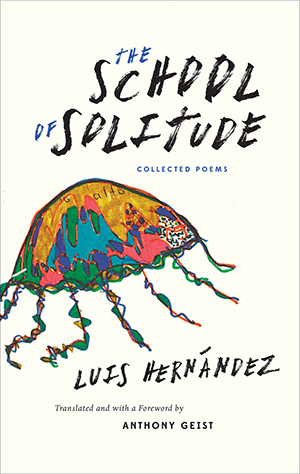Peruvian Poet Work Gets English Debut
Anthony Geist Translates Luis Hernández’s 'The School of Solitude'

Anthony L. Geist’s translation of Luis Hernández’s The School of Solitude has recently been short-listed for the 2016 PEN Award for Poetry in Translation. Geist was raised in Santa Barbara and is professor of Spanish and comparative literature at the University of Washington. Luis Hernández (1941-1977) was a Peruvian poet and physician. Geist will lecture on the challenges of translating Hernández and read from The School of Solitude on Thursday, February 18, at 2 p.m. at UCSB’s Mosher House Board Room. The event is free and open to the public.
Why were you moved to translate Hernández’s work? Luis (Lucho) Hernández published three books of poetry by age 25 and then stopped publishing but continued writing in notebooks. He was born in 1940 and died under mysterious circumstances in 1977, writing the bulk of his poetry in the ’60s and ’70s during the Youth Revolution. His work reflects the spirit of his times: rebellion, the Beatles, sex, drugs, and rock ’n’ roll, and yet is profoundly personal. This is what attracted me and moved me to translate it.
Hernández seems to see himself as part of the world tradition of poetry. And yet outside Peru, he is little known. Can you talk about that paradox? To paraphrase George Bernard Shaw, Latin America is a continent made up of 20 countries separated by a common language. Each of those countries has its own literary tradition and, with the exception of a few figures — García Márquez, Neruda, Borges, Carlos Fuentes — most writers have a hard time transcending their national boundaries. This is Hernández’s case. Legendary in his native Peru, he is little known outside it … My hope is that these translations will make him known in this country, and from here perhaps introduce his work to Spain and other countries in Latin America.
The lines in The School of Solitude tend to be very short, sometimes just a word or two. How do those short lines affect our reading of the work? Hernández’s poetry is very visual, often accompanied in the notebooks by drawings or personal icons (elephants, fish skeletons, stars, jellyfish, crabs) and lettered in his striking calligraphy. It is meant to be read on the page (which is not to say that it doesn’t also read beautifully out loud), and the short lines impose a rhythm, marking pauses, inviting us to linger over certain words. This is what Gérard Genette calls the “margins of silence” that distinguish poetry from other uses of language.
Anthony L. Geist will read from The School of Solitude on Friday, February 19, at 7 p.m. at Chaucer’s Books (3321 State St.). Call (805) 682-6787 or see chaucersbooks.com.



